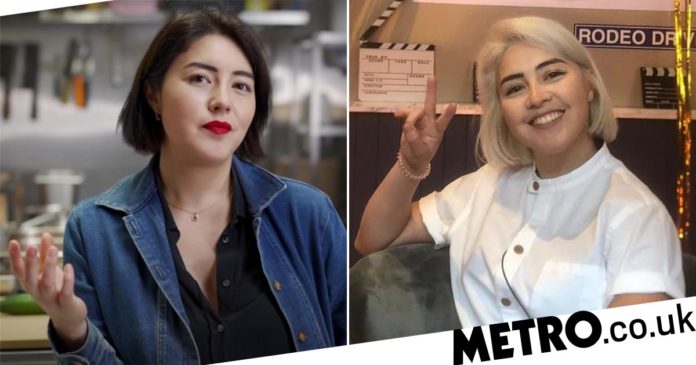A MasterChef contestant has had her cookbook removed from circulation after it was alleged she plagiarised another writer’s recipes.
Elizabeth Haigh, who competed on the BBC cookery competition in 2011, had her cookbook Makan – meaning ‘eat’ – published by Bloomsbury Absolute in May.
However, days after Singaporean writer Sharon Wee alleged that sections of Makan had been copied from her book Growing Up in a Nonya Kitchen, Bloomsbury has removed the book from circulation, citing ‘rights issues’ to Coconuts.
Wee, who lives in New York, published her part-cookbook, part-memoir in 2012, and recreated her mum’s recipes in the book.
She wrote on social media: ‘My book Growing Up in a Nonya Kitchen, first published in 2012. is both a cookbook and a memoir in which I recreated my mother’s personalised recipes, interviewed older relatives, researched by Nonya heritage, and recounted my family history.
‘I was therefore distressed to discover that certain recipes and other content from my book had been copied or paraphrased without my consent in Makan by Elizabeth Haigh, and I immediately brought this matter to the attention of the book’s publisher, Bloomsbury Absolute, I am grateful that Bloomsbury has responded to my concerns by withdrawing Makan from circulation.’
MasterChef winner Ping Coombes commented: ‘Hi Sharon, I’m shocked and felt for you that your work and most of all your memories have been treated this way. I admire your strength and thank you for speaking out. Please let us know what we can do to support. Very happy to shout out about your book so let me know where we can purchase, link to your bio and your blog. I’ll put it up on mine.’
Fellow winner Shelina Permaloo added: ‘I’m so sorry this has happened and I well done for your determination in making sure you defending your memories and your food history – sending love and look forward to getting a copy of your cookbook.’
While recipes are not protected by copyright law in the UK or US, it was noted that sections of prose and childhood memories in Makan bore a striking resemblance to sections in Wee’s book.
Poet and critic Daryl Lim Wei Jie compiled some of the similarities on Instagram, noting that the ingredients for a recipe for sweet potatoes in ginger syrup were listed the same.
Wee wrote in her book: ‘Ginger is thought to “pukol angin” (beat the toxic gases and dampness out of you to relieve aches and pains). Hence, post-natal mothers were given lots of ginger to “beat the wind”’, while Haigh wrote: ‘Ginger is thought to have healing properties – “pukol angin” (to beat the toxic gases and dampness out of you to relieve aches and pains). This is why postnatal mothers were given lots of ginger to “beat the wind”.’
In another section about finding ingredients, Wee had written: ‘’t faced many challenges along the way. It first started with converting her handwritten recipe measurements from katis to tahils (Old Chinese measurements) and learning the different daun (herbs) and rempah (spice pastes). Recipe testing in New York could be challenging. Shopping for ingredients necessary for our cuisine often entailed trekking down to Chinatown by subway…’
Meanwhile, Haigh wrote: ‘I faced many challenges along the way. It began with my having to translate hard-to-read handwritten notes, or convert measurements, and moved on to learning about the different daun (herbs) and rempah (spice pastes). Techniques aside, ingredients were hard to find, but thankfully I was just a bus ride away from Chinatown in central London.’
Another passage about chillies in Wee’s book read: ‘This particular type had been developed in Holland so that the Dutch could replicate their favourite Indonesian dishes back in their homeland, far away from their previous colonies. . . . My mother . . . always threatened to smear our lips with chilli paste if we ever told a lie. It was an effective tactic.’
Haigh’s entry read: ‘This type was developed in Holland so that the Dutch could replicate their favourite Indonesian dishes back in their homeland, far away from their previous colonies . . . When we were little, or growing up, if we were naughty, my mother would threaten to rub chili on our gums or put it on our toothbrush. We always behaved after that threat because we totally believed her.’
Haigh, 33, has yet to respond to the allegations, although there is no longer any reference to Makan on her Instagram account.
The website for Kaizen House, which she founded as a creative space for chefs, still reads: ‘In Makan, her debut cookbook, she draws together recipes that have been handed down through many generations of her family, from Nonya to Nonya, creating a time-capsule of a cuisine. Growing up, it was through food that Elizabeth’s mum demonstrated her affection, and the passion and love poured into each recipe is all collated here; a love letter to family cooking and traditions.’
The chef has also locked her Twitter account.
Following her time on MasterChef in 2011, Haigh co-founded the London restaurant Pidgin, which quickly earned a Michelin star.
She has since opened Mei Mei in Borough Market, and has appeared as a guest judge on MasterChef and on shows including Saturday Kitchen.
Metro.co.uk has contacted Haigh for comment.
MORE : Strictly Come Dancing’s Anton Du Beke could be demoted back to professional dancer for 2022 series
